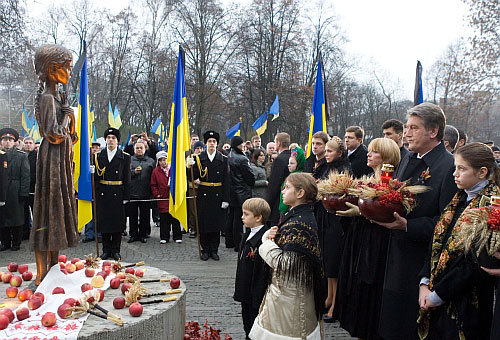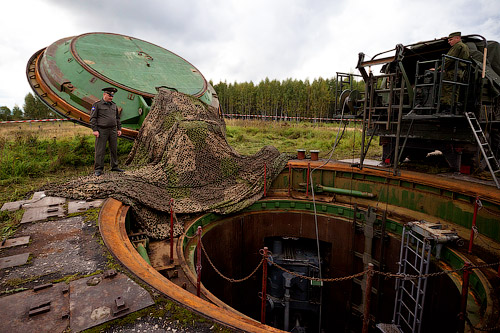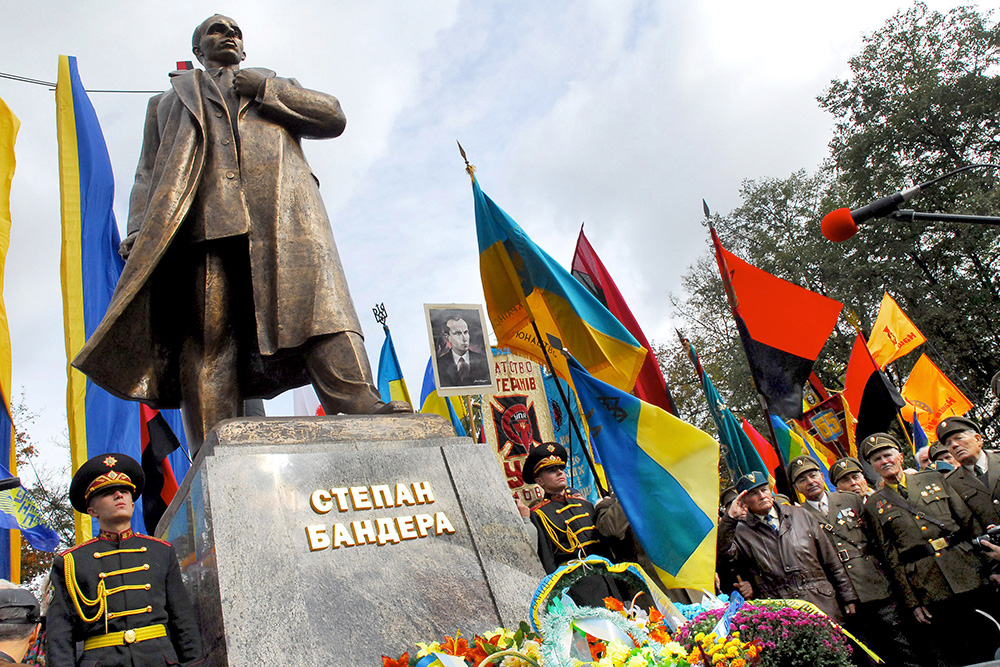The current crisis in Ukraine has much more to do with long-term problems of state building in Ukraine with underlying cause being far deeper than the surprise takeover of Crimea and the sudden creation of “Novorossiya”. In order to explain the current events, as well as the Ukrainian government's successes and failures in state building during the post-Soviet era, it is necessary to understand the problems of the Ukrainian state before the latest political crisis
1. Historical ties with Russia and lack of national identity
One of the long-term causes for the failure of Ukraine in state building is its ties and dependency on Russia, starting from Pereyaslav Treaty (1654) until and after 1991. To sum up the 400-year history briefly, Ukraine had been developing as a "subject" nation of Russia for the most of 400 years, despite some resistance and revolts in the time period, Russia had been partly successful in creating the "Provincialism" for Ukrainians, integrating many within Russia.
"The Russian" idea of Ukrainians as part of a Russian Empire presumes that Ukraine shouldn’t exist as a country and even as the idea, Ukrainian language is reduced to a mixture of Polish and Russian. Founder of Ukrainian integral nationalism Dmytro Dontsov described the idea of the resulting "provincialism" as "putting the interests of one province above the good of the whole nation. All of them were in rigorous opposition to the idea of nation building as a whole". Dontsov went on to suggest that the idea of Ukrainian state building was problematic due to the low level demands of the Ukrainians about having more powers for their province.
One person who tried to implement reforms and take up state building in Ukraine was Viktor Yushchenko. Having won the presidential elections in 2004, with massive support of the people from Orange revolution and expertise in government from being one of the most effective Prime Ministers of Ukraine (whilst at the position, he managed to resolve record high inflation and devaluation of currency by introducing a new currency "Hryvnya" in 1996), so the initial expectations had been set high.

One way that Yushchenko aimed to establish Ukraine’s national idea was via creation of museums, raising awareness about people who fought for Ukrainian national independence, and announcing reforms of the judicial system. The Holodomor memorial and the legislation about Holodomor calling it a genocide against the Ukrainian nation aimed to create nation building as it attempted to unify the whole of Ukraine under one tragedy where everyone both from the east and west had suffered due to communism.
Robert Conquest in "The Harvest of Sorrow" described Holodomor as "the older leaders were direct accomplices in the actual killing of millions of Ukrainians and others, in order to establish the political and social order prescriber by their doctrine". The recognition of Holodomor on a wider international level can be seen as one of the successes of Yushchenko’s main aims in politics, and the first attempt by a Ukrainian president to raise the issue to a worldwide level.
2. Languages and minorities
Another issue for any Ukrainian government that aims to create a strong nation state Ukraine's bilingualism, as any government would have to deal with the Russian language being actively used. For example, in the annexed Crimea, there was only "one school where all subjects were taught in Ukrainian" in Simferopol, whilst the rest of Crimea had only seven according to the former minister of education and science of Ukraine Ivan Vakarchuk.
The language problems for establishing a strong unitary state as Barry Buzan (a scholar on modern day Ukraine) pointed out "if societal security is about the sustainability within acceptable conditions for evolution of traditional patterns of language, cultural and religious and ethnic identity and custom, then threats to these values come much more frequently from within the state than from outside it." The language issues had contributed to the creation of national political cleavages, and a major split in terms of Ukrainian identity.
For Ukraine it means that its southeaster border is highly unprotected to internal threats because of regions with a Russian-speaking majority and Russian influences over the area. Hence any attempts of Ukrainian government to strengthen Ukrainian language within this region could be viewed by Russian minority as a form of "oppression" as Ukraine aimed to pursue its nation-building policies in "nationalizing state".
Roman Wolchuk, a scholar covering modern day Eastern Europe, described the problem of the policies as "seen as threatening to and by the minorities, something that could trigger centrifugal
tendencies. Furthermore, these centrifugal tendencies were prone to further aggravation by powers intent on causing internal turmoil in Ukraine." On the whole, from 1991 Ukrainian government failed to successfully resolve the language divisions in Ukraine, in a way that would both maintain the language of minorities and promote Ukrainian language in a long term.
3. Loss of military power
Ukraine reached 52 mn population in 1991 and having 3rd biggest nuclear arsenal with fully working conscription, almost 1 million troops and had all potential to become a serious world player in military field. However, due to international pressure and internal corruption, nuclear missiles had been given away by Ukraine’s first president Leonid Kravchuk and army had been reduced under Viktor Yanukovych’s ministers of defence by Yezhel, Salamatin and Lebedev (all of whom were ministers of defence between 2010-2014).

Wolczuk points out, that "The narrow military-defence conception of Ukraine’s national security, i.e. that the military power of other states presented the main threat to the security of the state and that the state was only defensible with military power, was merely the pinnacle of a pyramid of concerns that could be labelled security issues." It is impossible to have a strong and established state without a sufficient army to protect its borders, especially considering that Ukraine is surrounded by two major geopolitical alliances.
4. Democracy with no legitimacy
Another attribute of a strong state is its legitimacy. Ukraine’s legislative system has many practical problems but the fundamental problem for the legislative system in terms of for the state building is that it aims to react to Russian and USSR history. For example, due to Wolczuk, "the Ukrainian Left, with its strong pro-CIS, pro-Russian, anti-capitalist and anti-West orientation, tends to be elected by the ethnically Russian and Russophone constituency in the cities and rural areas of Southern, Eastern and Central Ukraine. In contrast, leaning toward the right of centre, the National Democrats have their power base in Western Ukraine with some support in Kyiv.
"
The fundamental problem that the disputes of pro USSR and anti USSR create is lack of sufficient political space for establishment and consolidation of democracy within the political structure.
This resulted in right wing parties, like Svoboda, UNA-UNSO and Right Sector, arising in order to counter Russian influence in the country. Despite all the nationalistic ideals, fundamental democracy remains in danger due to the lack of a rational choice for voters of a party that could be doing "nation building" yet at the same time not aim to be right wing. With the reaction parties being created, hence the people support not only a certain party but also tend to associate the party with the country as was the case with Party of Regions in Donbas being associated with being pro-Russian.
5. Russian geopolitical aims
Another problem in establishing a strong Ukrainian nation state is the Russian influence within its borders with Russia aiming to justify the influence with the high majority of ethnic Russians living in Ukraine. One way that Ukraine proposed to deal with the Russian pressure was CIS as "Russian authors and leaders look to the CIS as a restraining factor. Without the CIS they believe there would be an explosion of territorial disputes, particularly by Russia towards countries with large Russian minorities. To some degree this was one of the main reasons which then President Leonid Kravchuk sought to avoid in December 1991 when he proposed the establishment of the CIS."
Russian pragmatic foreign policy aims would fundamentally work to undermine a strong stable Ukrainian nation state. If Russia would aim to become a leading power in the region, Russia must ensure that Ukraine accepts Russia’s role in the region via joining the pro-Russian international organisations.
So far, before the crisis Ukraine had applied a multi-vector foreign policy in handling Russian pressure – which in itself had worked to weaken Ukrainian state consolidation. Whilst many of Ukrainian presidents and officials proposed different political solutions on the issue of Ukraine joining or not joining union with Russia, the country as a whole maintained its status outside of "political unions". This had helped Ukraine to solidify as a nation whilst being in the middle of EU and Russia, due to the ability to manage both sides.
6. Controversies around the national symbols
One of the key things for any state is the confidence in national symbols. During Yushchenko’s presidency, awarding Stepan Bandera and members of OUN/UPA with titles of Hero of Ukraine sparked controversy. As Timothy Snyder in The Reconstruction of Nation put it, "The UPA was part of an organization, the OUN-Bandera, which was ideologically committed to ethnic purity. … the UPA was successful in many of its endeavours because its causes were specifically Ukrainian ones".
The question of UPA is very provocative due to its nature, foremost; UPA fought against USSR, images of Bandera had been used for decades to scare politicians in both Kremlin and Warsaw. Yushchenko was the first Ukrainian president to raise the topic of UPA due to many Ukrainians fighting for and against the force. The question became an elephant in the room until Yushchenko had decided to aim it to build "national symbol".

Without getting into a heated debate about the correctness of actions of UPA it is a way for Ukraine to create a national symbol in order to build a national idea through a "national myth". Nonetheless, the success of the idea could be put under scepticism as firstly, years of following Russian propaganda made part of the population fearful of UPA in Eastern Ukraine.
Secondly since Yushchenko had failed in terms of unifying the nation through this “myth”, it would be wrong to claim that it had succeeded in state building. "A new loyalty to Ukraine can be built on the principles of political, economic and territorial unity which is inclusive and based on the Ukrainian ethnic core. A new political nation will have to incorporate all of the traditions which Ukrainians inherited." This highlights the biggest challenge for Ukrainian state building.
Euromaidan did not lead to failure; it redefined the idea of Ukraine’s nation state
The Euromaidan protests in many ways redefined Ukrainian nation and helped to build upon the creation of "the nation state" as firstly it aimed to be apolitical, secondly as it was a push for a humanistic values and principles, and thirdly as it used more Ukrainian symbols in terms of flags, songs, references rather than the party rhetoric.
A study found that most people (69.6%) that went to Maidan done so because of police brutality on 30th of November 2013, whilst (53,5%) was due to Yanukovych not signing the association agreement with EU. Yet, most people (91.9%) were unrelated to any party group or political party organisation, according to a Fund for Democratic Initiatives study. This could be interpreted as a call for the people to reform the governmental institutions of judicial and executive powers and hence it helps to create a stronger state building institution.
We can’t say that the political crisis in Ukraine had been a complete failure in state-building of Ukraine. To some extent yes, armed conflict in Donbas and the failure of Ukrainian government to stop Russia from taking Crimea had all long term causes due to Ukrainian state not having strong governmental institutions. On the other hand, Russia still has to take the blame for destabilizing the situation and oppressing the democratic development of Ukraine.
Euromaidan protests helped to develop nation-state building as they created a new generation of Ukrainians, those who speak Russian and yet see themselves as Ukrainians and want to continue to be Ukrainians from East to West. While Ukraine had failed in many aspects after 1991 to develop into a nation-state which many expected from the "Rukh" movement of the 90’s, nonetheless, the general public view Moscow far more critically than before, and henceforth the political crisis helped Ukraine to be more unified against the occupants.
[hr]Bibliography
- 'Ukrainian Only' School In Crimea In High Demand
Найменша кількість українських шкіл - в Криму
Майдан-2013: хто стоїть, чому і за що? - Democratic Initiatives Foundation study - Robert Conquest, The Harvest of Sorrow: Soviet Collectivization and the Terror-Famine
- Taras Kuzio, Ukraine: State and Nation Building
- Roman Wolczuk, Ukraine's Foreign and Security Policy
- Timothy Snyder, The Reconstruction of Nations: Poland, Ukraine, Lithuania, Belarus, 1569–1999
- Barry Buzan, People, States and Fear: The National Security Problem in International Relations
- Dmytro Dontsov, Nationalism




